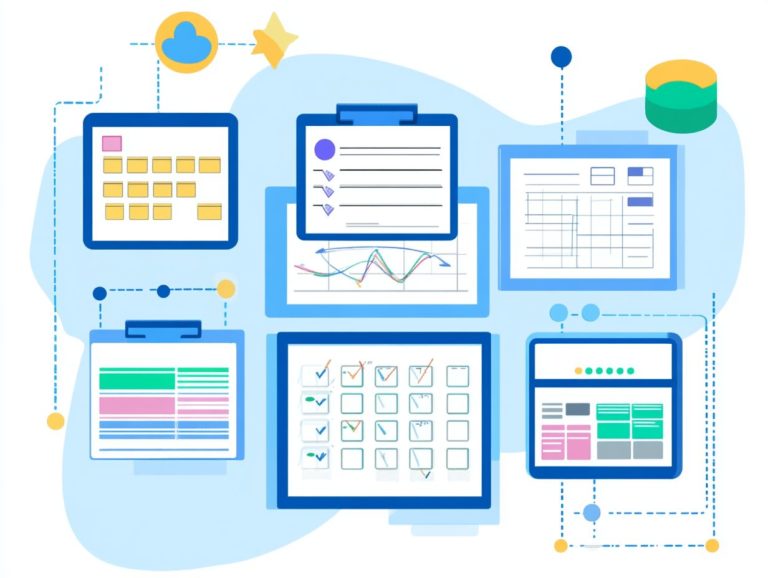The Impact of Economic Changes on Investment Risks
Economic changes have the power to reshape the investment landscape. They present exciting opportunities and formidable challenges.
Political shifts, social movements, and technological advancements all influence financial markets. It’s essential to understand how these changes affect investment risks.
You will explore the relationship between economic fluctuations and investment risks. This insight will empower you to make well-informed decisions on your investment journey.
Contents
- Key Takeaways:
- Economic Changes and Investment Risks
- Types of Economic Changes
- Impact of Economic Changes on Investment Risks
- Strategies for Managing Investment Risks During Economic Changes
- Long-Term vs. Short-Term Investment Strategies
- Frequently Asked Questions
- What is meant by the impact of economic changes on investment risks?
- How do economic changes affect investment risks?
- Are all investments affected by economic changes in the same way?
- How can investors minimize the impact of economic changes on investment risks?
- What are some potential benefits of economic changes on investment risks?
- How can investors stay informed about economic changes and their potential impact on investment risks?
Key Takeaways:

Economic changes significantly impact investment risks. Understanding this relationship is crucial for successful investing.
Political, social, and technological factors drive key changes in the market. Spreading your investments across different areas and applying risk management techniques are essential strategies. Your choice between long-term and short-term investments should consider these changes.
Economic Changes and Investment Risks
Economic changes have a big impact on investment risks. Fluctuations in global economic trends shape the environment in which you invest.
Changes like varying interest rates and inflation directly affect economic growth and your investments. Understanding how market forces impact consumer spending is vital for assessing corporate profits.
Financial markets react to these changes, presenting challenges and opportunities. Stay alert to navigate regulatory shifts and market volatility.
Understanding the Relationship
Understanding the connection between economic conditions and investment risks is crucial. This knowledge helps you optimize your portfolio and enhance returns.
Analyzing market forces, such as supply and demand, shows how you perceive risk. When the economy grows, consumer spending often increases, boosting sectors and your risk tolerance.
But rising loan costs can dampen enthusiasm, indicating tighter monetary policies. Evaluate these dynamics to align your strategies with the evolving economic landscape.
Types of Economic Changes
Economic changes arise from various factors, including political shifts, social dynamics, and technological innovations. Each element shapes the market and steers global trends.
Political, Social, and Technological Factors

Political, social, and technological factors drive economic changes. They impact everything from geopolitical events to market volatility and ethical investing.
By understanding how these elements interact, you can navigate today’s markets better. For instance, geopolitical tensions might impact commodity prices and shift trade agreements.
At the same time, technological advancements can disrupt industries, offering new opportunities and risks. As these factors evolve, they reshape market behavior and influence your investment choices.
Impact of Economic Changes on Investment Risks
Economic changes affect investment risks in complex ways. For instance, these shifts can influence bond prices, stock values, and the potential of new markets, highlighting the impact of interest rates on investment risks.
Each shift can reshape your investment landscape. This creates challenges and opportunities that deserve your careful attention.
How Economic Changes Affect Different Types of Investments
Economic changes influence investments uniquely. Factors like the chance of losing your money, interest-rate risk, and consumer goods performance are affected.
When the economy shifts due to inflation rates, job levels, or geopolitical events equities, bonds, and alternative investments are impacted.
For example, rising interest rates can lower bond prices, often pushing equity markets in the opposite direction. This shows why diversification is crucial; spreading investments across various assets can protect against market fluctuations.
This strategy is essential for navigating economic changes while aiming for long-term financial stability.
Strategies for Managing Investment Risks During Economic Changes
Effective strategies for managing investment risks are key to keeping your portfolio stable. Techniques like diversification help reduce potential losses and boost your confidence in uncertain times.
Diversification and Other Risk Management Techniques

Diversification is a cornerstone of investment management. It spreads risk across different assets, cushioning you against market volatility.
By combining various asset classes stocks, bonds, real estate, and commodities you can lessen the impact of any single investment’s poor performance. This not only enhances your return potential but also supports your long-term financial goals.
Prioritizing diversification builds a resilient portfolio. It prepares you to withstand unexpected economic shifts and events.
Long-Term vs. Short-Term Investment Strategies
When considering long-term versus short-term investment strategies, assess how economic conditions shape risk and return expectations.
Considerations for Economic Changes
Understanding economic changes is vital for your investment strategy. Pay attention to fluctuations in interest rates, inflation, and consumer behavior.
As the economy evolves, stay alert and adapt your approach. For instance, if interest rates rise, focus on sectors less affected by borrowing costs.
Conversely, in low inflation environments, equities or growth assets often perform well. By recognizing shifts in consumer trends, you can adjust your investments to target growing sectors.
Ultimately, flexibility is crucial for navigating financial market complexities. Ensure your strategies stay relevant and effective.
Frequently Asked Questions
What is meant by the impact of economic changes on investment risks?

The impact of economic changes on investment risks means how shifts in the economy like interest rate changes or market conditions can alter the risks associated with investments.
How do economic changes affect investment risks?
Economic changes can impact investment risks significantly. For example, a rise in interest rates can increase the cost of borrowing for companies. This makes it riskier for them to take on debt, which can potentially affect their stock value.
Economic changes can also influence consumer spending. This, in turn, affects business profitability and market volatility, all of which can alter the risks associated with investing.
Are all investments affected by economic changes in the same way?
No, different types of investments may be impacted differently by economic changes. Stocks often react strongly to interest rate changes. On the other hand, real estate tends to respond more to inflation.
It is important to consider the specific characteristics and vulnerabilities of each investment when assessing the potential impact of economic changes.
How can investors minimize the impact of economic changes on investment risks?
There are several strategies that investors can use to mitigate the impact of economic changes on investment risks. Diversifying your portfolio across different asset classes can help reduce risks.
Keeping a long-term perspective and regularly reviewing investments also helps manage risks and take advantage of potential opportunities.
What are some potential benefits of economic changes on investment risks?
Economic changes can create both risks and opportunities for investors. For instance, a decrease in interest rates may make it more affordable for companies to borrow money. This could lead to increased business growth and higher stock prices.
Additionally, economic changes can create market fluctuations, offering chances to buy quality investments at a lower price.
How can investors stay informed about economic changes and their potential impact on investment risks?
Investors can stay informed by regularly following financial news and updates and reading reputable sources. Seeking the advice of a financial advisor is also beneficial.
Regularly reviewing your investment strategy ensures it matches current economic conditions.






